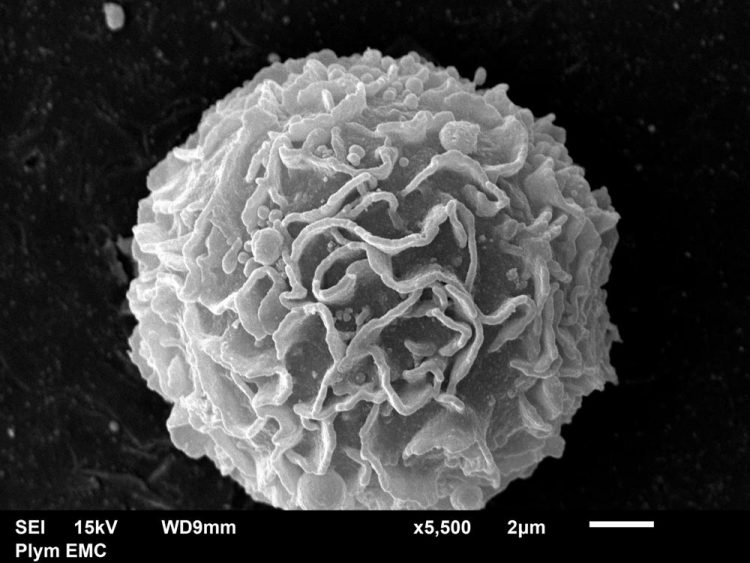Research highlights possible targets to help tackle Crohn's disease

A scanning electron microscopy image of a macrophage, total magnification x5500. Credit: University of Plymouth
Affecting around 115,000 people in the UK alone, Crohn's Disease is a lifelong condition which sees parts of the digestive system become inflamed. There is no precise cure and causes are believed to vary.
But one indicator of the condition – an abnormal reaction of the immune system to certain bacteria in the intestines – has had new light shed on it thanks to scientists at the University of Plymouth.
The research has focused on different types of cells called macrophages, which are part of our immune system and are found in most tissues, where they patrol for potential harmful organisms and destroy them.
In inflammatory diseases, like Crohn's, macrophages mediate the inflammatory destruction of the gut. Just how the tissue reacts (inflammation or suppression) is dependent on the type of macrophage cell present, and how it is stimulated – and scientists have been trying to get to the bottom of this.
The new research has shown how different types of macrophage – one type being pro-inflammatory and the other being anti-inflammatory – exhibit quite different molecular mechanisms involved in switching off their functional behaviour when bacteria are present.
And this difference, as study author Dr Andrew Foey explains, highlights the possibility of targeting and selectively suppressing the pro-inflammatory cells that drive diseases such as Crohn's Disease.
“This small step in understanding of differential off-signalling of macrophage type may go hand-in-hand with understanding the relapsing/remitting presentation of Crohn's Disease,” he said. “It is suggestive of future research endeavours in targeting macrophage responses in the treatment of inflammatory diseases – and it's a really positive step.”
The full study, entitled 'Macrophage subsets exhibit distinct E. coli-LPS tolerisable cytokines associated with the negative regulators, IRAK-M and Tollip' is available to view in the journal PLOS ONE (doi: 10.1371/journal.pone.0214681).
The research was led by Dr Andrew Foey with Dr Khalid AlShaghdali and PhD student Barbara Durante from the School of Biomedical Sciences at the University of Plymouth, in collaboration with Dr Jane Beal, from the School of Biological and Marine Sciences.
Infection, Immunity and Inflammation is one of the key research themes in the Institute of Translational and Stratified Medicine (ITSMed) at the University of Plymouth.
The work was funded by University of Hail, Kingdom of Saudi Arabia.
Media Contact
More Information:
http://dx.doi.org/10.1371/journal.pone.0214681All latest news from the category: Life Sciences and Chemistry
Articles and reports from the Life Sciences and chemistry area deal with applied and basic research into modern biology, chemistry and human medicine.
Valuable information can be found on a range of life sciences fields including bacteriology, biochemistry, bionics, bioinformatics, biophysics, biotechnology, genetics, geobotany, human biology, marine biology, microbiology, molecular biology, cellular biology, zoology, bioinorganic chemistry, microchemistry and environmental chemistry.
Newest articles

Webb captures top of iconic horsehead nebula in unprecedented detail
NASA’s James Webb Space Telescope has captured the sharpest infrared images to date of a zoomed-in portion of one of the most distinctive objects in our skies, the Horsehead Nebula….

Cost-effective, high-capacity, and cyclable lithium-ion battery cathodes
Charge-recharge cycling of lithium-superrich iron oxide, a cost-effective and high-capacity cathode for new-generation lithium-ion batteries, can be greatly improved by doping with readily available mineral elements. The energy capacity and…

Novel genetic plant regeneration approach
…without the application of phytohormones. Researchers develop a novel plant regeneration approach by modulating the expression of genes that control plant cell differentiation. For ages now, plants have been the…





















